- Home
- Nancy Buckingham
Valley of the Ravens Page 12
Valley of the Ravens Read online
Page 12
At last we began to descend the Farracombe valley and, through the curtains of driving rain, I saw welcoming lights in the windows of the house. A few minutes later we clattered into the courtyard, dripping wet, and turned in to the central archway of the stable block.
As grooms ran out to take our horses and we headed toward the house, I instinctively raised my eyes to the window above the porch. Yes, Uncle Joshua was there, observing us. With a plunging heart, I wondered what he would make of the fact that Jerome and I had been riding alone together in a heavy storm of rain.
When we reached the shelter of the porch, Jerome paused and lightly laid his hand upon my arm.
“Sarah—I beg you to consider very carefully— what good can come of your staying here at Farracombe?”
I saw in his eyes the dark shadows of pain that I had seen there once before, that time in his office. Again I asked him the same question.
“Do you want me to go, Jerome?”
“You know I don’t, my dearest. But if you stay, I cannot answer for the consequences.”
The front door was opened, and lamplight spilled out into the darkening afternoon, catching us unawares. A footman stood there, bowing.
“Thank you, Henry,” said Jerome with a nod to the man. “Sarah, you must get to your room at once and out of those wet things. I will see you at dinner.”
Yes indeed, we would see one another again at dinner, and everything would be as before. Jerome belonged to Nadine, and he would continue to act the part of her devoted husband. I knew now that he neither loved her nor was faithful to her, but the knowledge brought me no comfort.
* * *
Chapter 10
>
Ginny was spending more and more of her time closeted with Nadine. Not, I felt certain, because she enjoyed being with her sister-in-law. On the contrary, she seemed more edgy and tense than ever after these sessions. I was driven to the conclusion either that she went to Nadine’s room in order to avoid me, or that Nadine deliberately encouraged her in order to keep us apart. Probably both.
I felt hurt, and depressed, but I refused to give up trying to win back Ginny’s trust and friendship. One morning, at breakfast, I said cheerfully, “It looks as if it’s going to be a lovely day, Ginny. Shall we go for a ride this afternoon?”
“I can’t,” she said, glancing down at her plate. “I’m going with Jerome and Nadine to have luncheon at the parsonage.”
“Oh, I see. I didn’t realize you were to accompany them.”
Thirza said hastily, “It will make a nice change for Ginny. She gets out so rarely.”
“Much too rarely,” I agreed. “That’s why I keep suggesting that we should go out together—not just riding on the moor, but for an outing to Lynmouth, or a shopping trip to Barnstaple by train.”
Ginny gave the appearance of being totally absorbed in her scrambled egg and kidney, but her high color betrayed that she was aware of what I was saying. Across the table, Thirza shook her head at me warningly, so I dropped the subject. But immediately after breakfast, when she was about to hurry upstairs, I waylaid her.
“Aunt Thirza, why did you stop me from talking any more about taking Ginny out?”
She looked flustered. “It—it isn’t good for the child to be upset, Sarah.”
“Why should that upset her?” I persisted.
“Ginny is very high-strung, as you know. We have to take care.”
“But, surely, taking Ginny out and about could only have a beneficial effect?”
There was a haunted look on Thirza’s face. “I know what you say is right, Sarah dear, but we mustn’t try to rush things. After all, Ginny is lunching at the parsonage today. That is a nice little outing for her. Now, I really must go up to Nadine.”
I watched her hurrying up the staircase, running away from my awkward questions. Yet what was it that made my questions awkward, I wondered unhappily. Why was it that Ginny and I were being kept apart?
It had been the same with Miss Fincham, of course. She, too, had been close to Ginny, so she had been sent away.
All through the morning Ginny was at her lessons with Horace Smallbridge, so I kept well out of the way. I preferred not to meet the curate if possible. I was up in my room about midday when I heard the grate of wheels in the courtyard. I went to the window and saw Thomas Tassell bringing the carriage to the front steps. A couple of minutes later one of the footmen ran down to open the carriage door, then came Jerome bearing Nadine in his arms. He placed her carefully within and, taking a crimson rug from the footman, tucked it around her.
I saw them both glance up to acknowledge Uncle Joshua at his window above the porch. Then Jerome’s eyes moved along and came to rest on me, where I stood watching them. It was too late to draw back out of sight, so I raised my hand in a wave. Jerome did not smile at me, but gave a tiny, almost imperceptible bow of his head.
Ginny came running out to join them, scrambled in with a helping hand from Jerome, and the carriage moved off. I caught a glimpse of her small white face looking up at her father. Then as her eyes met mine she glanced away hastily without any salutation.
I watched the carriage until it was out of sight, gripped by a strange feeling of emptiness.
I felt no inclination to go out, but I made myself walk in the grounds for a short time, thinking it would do me good to be in the fresh air.
Returning by way of the orangery, I was crossing the hall when I heard voices from the morning room—Oscar and Thirza. Something in the tone of their exchange—a kind of suppressed anger—made me pause and listen.
“You’d never dare get into this condition if Nadine was in the house,” Oscar was saying. “You’re a fool. God knows what you might let out.”
Unashamedly, I moved closer to the door. But I could not catch Thirza’s mumbled reply, and Oscar continued impatiently, “There’s nothing to fear from her, but you could ruin everything with your stupid drinking. For heaven’s sake, woman, pull yourself together.”
Thirza’s voice became shrill but her words were slurred from the effect of alcohol. I thought I heard her say, “You know nothing—nothing.” Then, more distinctly, “You think you understand what she is capable of, but I tell you—”
“Be quiet. You’re drunk.”
There was a sharp cry from Thirza, as though Oscar had slapped her face, and I wondered if I should intervene. But that would mean admitting I had overheard them quarreling. As I stood hesitating, I heard a movement across the hall, and swung around in confusion. The housekeeper stood watching me, her hands clasped at her waist.
“Mrs. Bardock. I was just—I didn’t want to interrupt.”
She nodded, unsmiling. “There is a letter for you, Miss Sarah.”
“A letter?”
She went to the marble console beside the front door and picked up an envelope from the silver salver. “It seems to be from Miss Ginny.”
“Oh?” I said, surprised.
As I took the envelope from her I noted that it bore just my name, the letters formed in a childish hand. The message inside was brief, unsigned. All printed in the same clumsy letters.
You should not have come back to Farracombe— there is no place for you here. Go now, while you can, before it is too late.
I stared down at the note with a sense of disbelief, and a tremor ran through my body.
“There is nothing wrong, I trust?” Mrs. Bardock inquired.
I pulled myself together. “No, nothing. Did you say this note was from Ginny? Are you sure?”
“Well, it looked to me like the sort of writing she might do—for fun, I mean.”
“But you did not actually see her put it there?”
“No, Miss Sarah. I just assumed that it must be from Miss Ginny.”
She was looking at me very oddly, but I had to persist. “When did you first notice the envelope, Mrs. Bardock?”
“It was just after I saw Mrs. Jerome off in the carriage. I noticed that some letters had been put out for post
ing, and I thought I’d take them to the kitchen ready for Will Lovelace to collect. That letter for you was among them.”
“I see,” I said slowly. “What—what were the other letters?”
She spread her hands in a shrug. “There were several from Mrs. Jerome, I think. And one that Rudd had put there for Mr. Lefevre—I didn’t really look at them closely.”
I decided I would gain nothing useful from questioning her any further, and I wanted to get away on my own, to think.
“It’s just a little puzzling, Mrs. Bardock,” I murmured. “But I expect it’s some sort of joke, that’s all.”
I felt the housekeeper’s eyes still upon me as I made my way upstairs, and I endeavored to look unconcerned. At the head of the staircase, I paused. Rudd was backing out of Uncle Joshua’s room in his obsequious way, the old man’s voice thundering after him. “You damned fool, man! Can’t I trust you to get the least thing right? Go down and make sure, for God’s sake.”
Rudd closed the door and, turning, saw me standing there. His normally masklike face showed startled surprise, but he recovered himself, nodded curtly, and scurried past me down the stairs.
Safe in the privacy of my room, I sank into a chair and sat staring bleakly at the letter. My heart was thudding, my palms felt cold and clammy.
Was it really from Ginny? I wondered. Did she feel caught up in a sort of emotional tug-of-war between myself and Nadine, and had she written the note out of desperation? Or was it from someone who had deliberately adopted a childish hand as a disguise? In that case, it might have been anyone in the house— even Nadine.
If Oscar had told her about seeing Jerome and me together, Nadine might consider me a potential danger to her marriage. Moreover, she had never really wanted me at Farracombe—that was evident from the way she had tried to marry me off to Horace Smallbridge. So was it Nadine, slipping the envelope in among other letters for posting, and sending them downstairs by her maid?
Or Uncle Joshua? He hated me, I was convinced of it. Hated me for being my father’s daughter—and perhaps, also, because I’d refused to submit meekly to his bullying. What was it I had heard him shouting at Rudd just now? Go down and make sure, for God’s sake! Was he referring to the letter, to make certain it had reached my hands? I remembered Rudd’s startled face when he turned and saw me, the way he had gone scurrying off.
Yes, surely it was Uncle Joshua who had written the letter.
Or was it Thirza? Or Oscar? Or the two of them acting together? They had never shown me any hostility, quite the reverse, but I knew they were both devoted to Nadine, and their first loyalty would always be to her. Had they viewed Jerome’s growing interest in me as a possible threat to Nadine, and in consequence been trying to frighten me away? Only this morning, just a few minutes ago, I had heard them quarreling. What had that been all about? And what was it that caused Thirza to live in a state of constant fear, which I had noticed almost from the moment of my arrival?
The questions flowed ceaselessly through my brain, tormenting me.
Could the letter even have been sent my Jerome? I wondered with a sudden jarring pain. He had repeatedly told me that I should leave Farracombe. He had even said that if I stayed on he could not be held answerable for the consequences. Was this his way of trying to force my hand?
I closed my eyelids, trying to hold back the tears. How could I know whom to trust in this house? Could I trust anyone at all?
I would have to keep alert and be on my guard. To watch. And wait.
A soft tapping at the door jerked me from my unhappy thoughts.
“Who is it?” I called.
“It’s me, miss—Mary.”
“Oh yes—come in.”
The maid entered, eyeing me with curiosity.
“Are you all right, Miss Sarah? Mrs. Bardock said that you seemed upset earlier on.”
“I’m perfectly all right, thank you.” I went to the dressing table and began tidying my hair. “Is there something else, Mary?”
“It’s about luncheon, miss. Mr. Metherell says seeing as how Mr. Medwyn’s just gone out, and Mrs. Sellick’s indisposed, will you be wanting yours served in the dining room?”
“Oh, I see.”
It didn’t surprise me that Thirza had not wished to appear at luncheon in her intoxicated condition. But Oscar? Was he absenting himself to avoid lunching alone with me?
“Please tell Metherell that a tray in the morning room will be quite sufficient for me. Thank you, Mary.”
In the event, I found I could hardly touch the grilled lamb cutlets and green peas Batsy sent in for me. I sipped a glass of white wine to try and dispel the chill that gripped my body, but it seemed to have little effect.
... there is no place for you here. Go now, while you can, before it is too late.
A fragment of overheard conversation drummed in my brain. Oscar saying, There’s nothing to fear from her. And Thirza, replying, You think you understand what she is capable of.
Was it me of whom they were speaking in those terms? Or could it have been Nadine? Or Ginny?
The whirling confusion of my thoughts made me feel dizzy and ill. I laid down the knife and fork and made my way through the silent house back to my bedroom. I felt a desperate need for someone to confide in. But there was nobody.
* * * *
Outwardly, there seemed nothing to mar the enjoyability of the occasion when the Westbrooks came to dinner the following evening. Nadine was a charming, gracious hostess, and Cynthia, reveling in her new married status, chattered away with great animation.
Lost in my own somber thoughts, I suddenly became aware that Cynthia was addressing me.
“What a sly one you are, Sarah.” Her eyes swept the room to include everyone in the conversation. “Would you believe it, when Sarah rode over to see us the other day with Ginny and Jerome, and I asked her if she had a suitor, she emphatically denied it. Yet all the time she was being fervently courted by that odd little curate.”
“Please, Cynthia,” I protested.
“Not that I blame you the tiniest bit, dearest, for refusing him. Oh yes, it reached my ears—never mind how—that he had actually popped the question. What effrontery. All the same, any proposal of marriage, however unsuitable, is gratifying to a woman, is it not?”
“I would prefer not to talk about it,” I said faintly.
“Then I shan’t say another word on the subject. Horace Smallbridge is unimportant.” Again her eyes swept the room, and I saw that she was delighted at being the center of attention. “You know, Sarah, I shouldn’t be in the least surprised to find you have a secret sweetheart. I remember what extreme interest you showed when I happened to mention that old hunting lodge in Ravens’ Valley.”
“Cynthia, my love,” her husband reproved.
She looked crestfallen. “Oh, Richard darling, have I said something indiscreet? You must forgive me, everyone.”
I could feel my cheeks flaming, and I was grateful that Jerome swiftly changed the subject. Cynthia, her faux pas at once forgotten, happily followed his lead and began to talk excitedly about the alterations they were planning to have done at Riversmeet Hall.
Over dessert, the conversation turned to the West-brooks’ honeymoon trip. Cynthia was ecstatic about the beauty of the Swiss mountain scenery, and her vivacity seemed to touch Uncle Joshua’s heart. Indeed, he was quite genial with her.
“I understand, my dear Lady Westbrook, that you extended your tour and spent a month in the South of France? I have often wondered if I might not retreat somewhere like that one day. My doctor keeps telling me I should seek a more congenial climate.”
Cynthia clapped her hands in delight. “Oh, Mr. Lefevre, you would simply adore the Riviera. It is perfectly wonderful, is it not, Richard?”
“Yes indeed, it is very pleasant,” her husband agreed fondly.
She pouted at him prettily. “How cold and unemotional men are! The Riviera is more than just pleasant, Richard. It is beautiful, exciting, a
nd so romantic—and now so fashionable. No one who has been there could deny it.
Sir Richard smiled indulgently at her enthusiasm. “Perhaps, my love, you are recommending the new resorts to people who know them better than we do. I believe you told me, Jerome, that you had been there a few years ago?”
“Yes, I spent the long vacation there once when I was up at Oxford. The parents of a friend of mine had taken a villa at Cannes.”
“And you, Nadine?” asked Cynthia. “Have you ever been there?”
Nadine shook her head regretfully. But Oscar, at the same instant, broke in, “Yes indeed, we spent nearly six weeks at Monte Carlo.”
“We?” queried Jerome. “Do you mean with Nadine and Aunt Thirza?”
“That’s right.” Then, seeing Jerome’s expression, Oscar flushed a deep red and he glanced helplessly at his sister.
Aunt Thirza, sitting opposite me, gave a gasp of consternation, and her hands flew to her throat. She, too, glanced at Nadine, with panic in her eyes.
Nadine’s cool poise was broken. I saw two spots of high color on her cheeks, and her hand trembled so that she nearly spilled the wine in her glass.
In a curiously flat voice, Jerome said, “You never mentioned to me, my dear, that you had been to Monte Carlo.”
Already Nadine was recovering. I could not but admire her self-control.
“Goodness,” she exclaimed, with an amused smile, “I haven’t told you every little detail of my life, Jerome. It would have bored you to death.”
“A six-week stay in Monte Carlo is hardly a little detail,” he pointed out. “Even when I suggested taking you there after we were married, you said nothing about it.”
Nadine’s glance dropped—to her crippled legs. She spoke softly. “It is a long time, Jerome darling, since you talked about taking me to Monte. And now let us speak of something else. We have guests.”

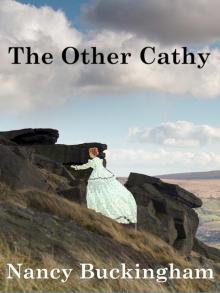 The Other Cathy
The Other Cathy Design for Murder
Design for Murder Valley of the Ravens
Valley of the Ravens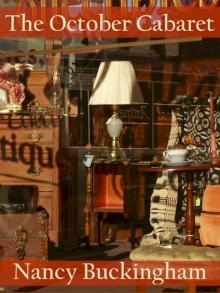 The October Cabaret
The October Cabaret Model Murder
Model Murder Murder in the Cotswolds
Murder in the Cotswolds Deadly Deceit
Deadly Deceit Return to Vienna
Return to Vienna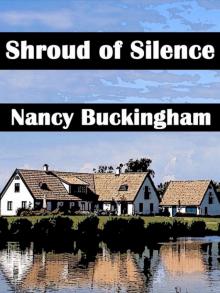 Shroud of Silence
Shroud of Silence The Silver Castle
The Silver Castle A Cotswolds Legacy
A Cotswolds Legacy Marianna
Marianna Cold Coffin
Cold Coffin Kiss of Hot Sun
Kiss of Hot Sun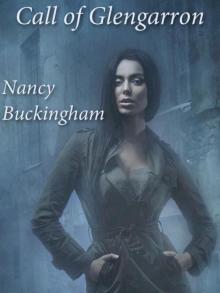 Call of Glengarron
Call of Glengarron Quest for Alexis
Quest for Alexis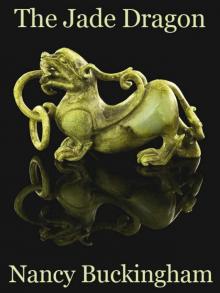 The Jade Dragon
The Jade Dragon